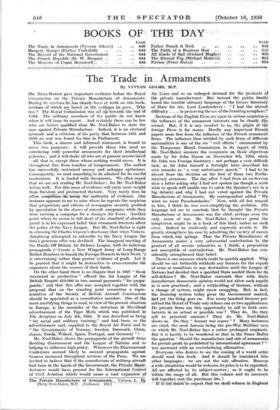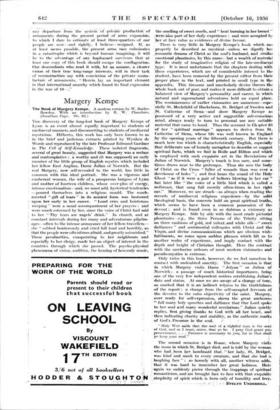The Trade in Armaments
BOOKS OF THE- DAY
By VYVYAN ADAMS.
Mn. NOEL-BAKER gave important evidence before the Royal Commission on the Private Manufacture of Armaments:- During its sessions, lieJuis. clearly been at work on this book, sections of which are based on the evideep,geJ gave.. Why: not ? The Royal Cominission Was 'set- iirrtOwards the ind-Of 1934. The ordinary members of the public do not know. when it will issue its report. And certainly there can be few who are better qualified than Mr. Noel-Baker to state the case against Private Manufacture. Indeed, it is an electoral anomaly and a criticism of his party that between 1931 and 1936 no seat was found for him in Parliament.
This book, a sincere and informed statement, is bound to serve two purposes : it will provide those who need no convincing with-powerful armaments for their _ intellectual polemics ; and it will shake all who are at present unconvinced —all, that is, except those whom nothing would move. It is throughout free from touches of temperament. The author-, has successfully restrained uneasy and unhappy optimisms. Consequently, we read something to be admired for its careful moderation. It is leaded with documents. We often regret that we are not reading Mr. Noel-Baker : for Mr. Noel-Baker writes well. For this mass of evidence will parry more weight than flatulent and protracted rhetoric. Very rarely does he allow -ebitjeTerusirikinthrautbority Of :evidence: One instance appears to me to arise where he repeats the suspicion that proprietors and 'editors of newspapers recently profited by speculation in the shares of aircraft companies while they were running a campaign for a Stronger Air Force. Another point where he seems to fall short of the standard of absolute proof is in his expressed belief that armament interests affect the policy of the Navy League. But Mr. Noel-Baker is right in stressing Sir Charles Craven's disclosure that when Vickers- 4r113,4rPnllAtt.emPtcIl to subscribeNavy League the firm's generous offer was declined. The inaugural meeting of the Hands Off Britain Air Defence League, with its ludicrous propaganda (',` Create a New Winged Army of Long-Range British Bombers to Smash the Foreign Hornets in their Nests ') is entertaining rather than precise evidence of graft.' :Let it be granted that it might be instructive to cross-examine the organisers about the sources of their funds.
On the other hand there is no dispute that in 1927 " those interested in production" offered the Air League of the British Empire' g1ll,000 in two annual payments 'for:propi=- ganda," and that this offer was: accepted together with the proposal that on the standing joint committee a repre- sentative Of the Society of British Aircraft Constructors should be appointed as a consultative member. One of the most mortifying things to read, in view of the present situation in Europe, is the reminder of the notorious de Havilland advertisement of the Tiger Moth which, was published in The Aeroplane on July 4th, 1934. It was described as being ",for_ nayki and military training," and had been, . so the advertisement said, supplied to the Royal Air Force and to "the - Governments of Norway, Sweden, Denmark, China, Japan, PerstifVoland, Spain;- Portugal, and- Germany " !
Mr. Noel7Baker shows the propaganda of the aircraft fir* deriding disarmament and the League of Nations and so helping to influence high policy. Whenever the Disarmament Conference seemed likely to succeed propaganda against Geneva increased throughout sections of the Press. We are invited to believe that if the manufacture of military aircraft had been in the hands of -the Government, the Private:B.40i- facturers would have pressed for the International Control of Civil Aviation which would cause a vast expansion 9f The _Private Manufacture of Armaments., .3791unA*-4.,-A rhilip'Noell/3tiker;'31:r. (GoUancz 18sj '-
Air Lines and so an enlarged demand for the products
the private manufacturer. But instead the. public finally heard the terrible obituary language of the former Secretary' of State for Air, Lord Londonderry : I had the utmo0 difficulty. . . in preserving the use of the bombing aeroplane:? 'Sections of the English,Press are open to serious.suspiefon70, the influence of the armament. interests can be clearly cerned. But, if it is any comfort to us, the plight of tlie' foreign Press is far worse: Hardly any important French'
papers seem free from the influence of the French armament
firms. The influence thus wielded by such firms of different nationalities is one of the six "- evil effects" -enumerated by
the Temporary Mixed Commission in its . report, of 1921.
Mr. Noel Baker answers the comments on -thOSe T,objectives made by Sir John Simon on November 8th; 1984, when
Sir John was Foreign Secretary : not perhaps a very difficult tisk, as Sir John himself a fortnight later described his Min remarks as "a very unfortunate speech." I had to be absent from the division on the first of those two Parlia- mentary occasions. The day after I had from an ex-Service Men a letter asking why 'I had not spoken (as though a mere wish to speak will enable one to catch the Speaker's eye in a big debate) and why I had not voted against the Private Manufacture of Armaments. My correspondent added " want no more Passchendaeles." Now, with all due respect to him, I think he was over-simplifying the problem. His language led me to conclude that he thought the Private Manufacture of Armaments was the chief, perhaps even the only, cause of war. Mr. Noel-Baker, however great the temptation might be in a book of this kind, makes no such error. Indeed he studiously and expressly avoids it. He greatly strengthens his case by admitting the variety of causes
from which wtir springs. That the Private:Manufacture of Armaments makes a very substantial contribution to the greatest of all secular calamities is, I think, a proposition not susceptible of contradiction. Mr: Noel-Baker has con- siderably strengthened that belief.
There is one measure which could be quickly applied. Why Should we not forthwith withhold any licences for the export
of arms or munitions to any destination until the League: Ar.
Nations had decided that a specified State needed them for its self-defence ? Mr. Noel-Baker contends that with State
manufacture democratic opinion would not allow such export is' is now practised ; and a withholding of licences, without a -change of system, might cause smuggling. But, in fact,
the licensing system today gives the Government control,
vind yet the thing goes on: For every' hundred licences per- finned the Board of Trade only refuses one or two applications.
Do private firms use this opportunity to sell to both corn-
batants an-aCtual or ilesiible war? 'They do. Do they 'sell to potential enemies ? They do. Mr. Noel-Baker Shows us. Do they" foment war scares " ? Many instances
are cited, the mot famous being the Pre-War Mulliner case On which Mr. Noel-Baker lays a rather prolonged emphasis.
But it is hardly to -be wondered at that in the Peace Ballot the question "Should the manufacture and sale of armaments for private profit be prohibited by international agreement ? was answered with an overwhelming affirmative.
. Everyone who desires to sec the coming of a world 'order should read this book. And it should be translated into
other languages : we are not the sole offenders. Because a wide circulation would be welcome its price is to be regretted. All are affected by its subject-matter ; so it ought to be Within the range of all. But this volume and its successor *ill together post, the purchaser 36s.! oxt iTatich"to- expect that Ave shatvitness- brEngland any departure from the system- of private prodtiction of armaments during the present period of arms expansion, to which I dare to estimate at least three-quarters of our people are now—and rightly, I believe—resigned. If, _Hs at least seems possible, the _present arms race culminates in a catastrophe which is beyond human imagining, it will be to the advantage of ay -haphazard -.survivors that at least one copy of this book should escape the conflagration. Our descendants who read it with„ let us assume, a clearer vision of their true long-range interests, will in their task of reconstruction say with conviction of the private manu- facture of armaments, "Herein lay an important element in that international anarchy which found its final expression in the war of 19—."





















































 Previous page
Previous page